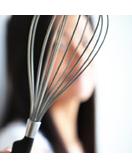Throughout these years, I have learned valuable cooking and baking knowledge and have shared heaps to many readers. Strangely and occasionally, I have came across suspicious readers who were out-front with me, asking me why am I doing this. Like I always say, I'm baking and sharing recipes simply because I like it. ^-^
Despite that I'm always trying my best to share, there are times that I can't write and publish some really good recipes promptly due to the fact that I'm a busy working mom and blogging is just a hobby, not my job! Nevertheless, I still try to record most of the good recipes that I have tried even with the details on how we enjoyed the food for my personal remembrance. Well, we have to agree... Writing and sharing recipes can be very time consuming!
Lately, I have been baking a series of super soft breads and realised that I have to publish this recipe first so that I can explain the subsequent discovery of many other SUPER SOFT bread recipes.
Oh! We can't deny... SUPER SOFT breads are yummy!!! And I thought that it will be a shame if I don't share these recipes. Hence, if you like to know more, you might want to read this story to know how it started...
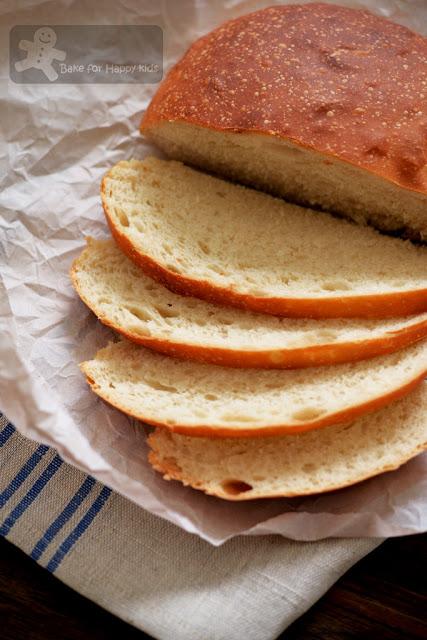
This Super Soft Sourdough Bread is one of the BEST recipes that I have baked before.
... but sadly, I didn't have the time to publish it earlier.
It was years ago who my family and I had this conversation...
"Try these! These bread are very soft!" I said to my husband and son as I was serving these sourdough bread as part of our dinner.
"Sure???" As usual, my husband likes to underrate my capability and always give me a skeptical look whenever I said that I have made something good... *sign*
"See this"... I placed a slice of bread on my left palm and allow its soft and oversize edges draped over my hand. Then, I used my right index finger to poke a middle part of the bread and the spot is so spongy soft that it kept bouncing back.
"See, see, see..." I was gaining good confidence showing off the softness of the bread and kept pressing it. LOL!
Seeing this, my son was totally impressed and said "Give me four!" Next, I heard "Me too!" Then, the bread was gone very quickly.
I discovered this really really really super soft sourdough bread recipe when I was maintaining my sourdough starter at here several years ago. I must confess that looking after a sourdough starter is not easy. It's like nurturing a pet that needs constant feeding and cleaning with lots tender loving care... After 3-4 long months of stirring and jar washing , I gave up! I had to kill my sourdough because I need a holiday!!! LOL!
Before I "murdered" my precious, the least is I have discovered this really really really super soft sourdough bread recipe that leads me to many other baking discoveries...
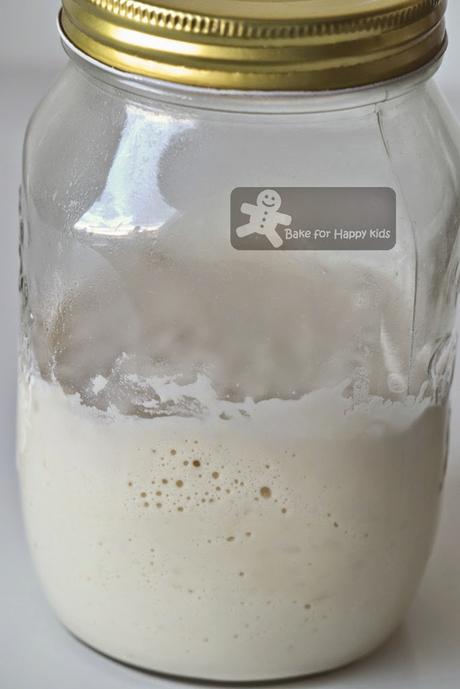
At first, I have baked this bread with this 12 hr old sourdough starter.
Then... No sourdough starter??? No worries!!!
After I "murdered" my precious sourdough, I have baked this recipe with an instant yeast overnight starter culture and it works perfectly well too. The bread made with the instant yeast overnight started is equally soft like the sourdough one but sadly, it doesn't have the lovely sweet sourish taste! I so miss my sourdough starter!!! sob sob...
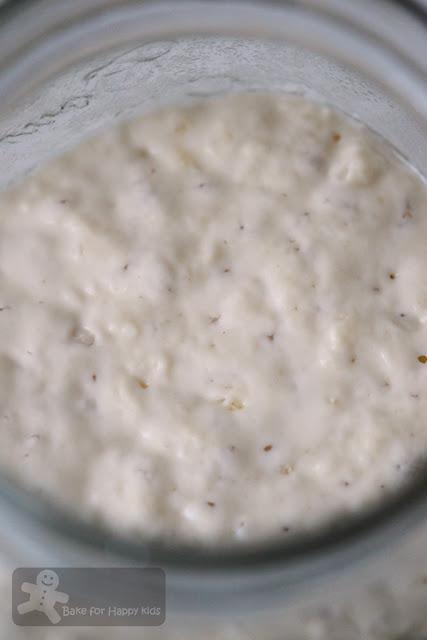
If you don't have a sourdough starter, you can bake this bread with an instant yeast overnight starter.
Do you have your sourdough or instant yeast overnight starter ready?On the day of bake...
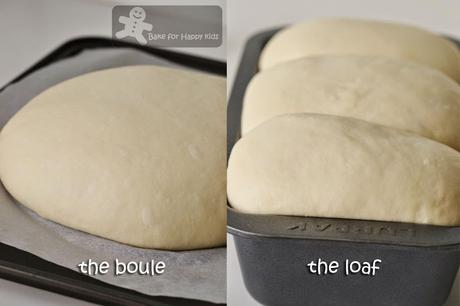
These ready-to-bake breads are made with my sourdough starter.
To bake these breads, I have learnt that I can use two options:
One: The steam-baking method
I have used this option to bake the sourdough boule and the overnight starter sandwich loaves for a deep and flavoursome crust.
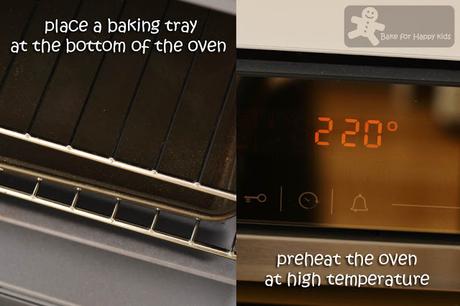
The steam-baking method: preheat oven with a baking tray at 220°C with or without fan forced.
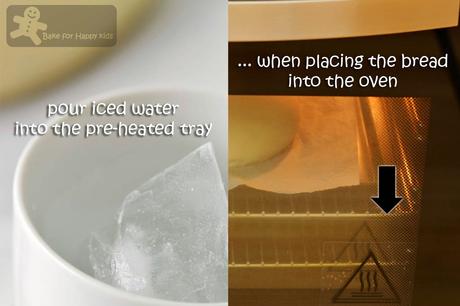
Then, I did this.
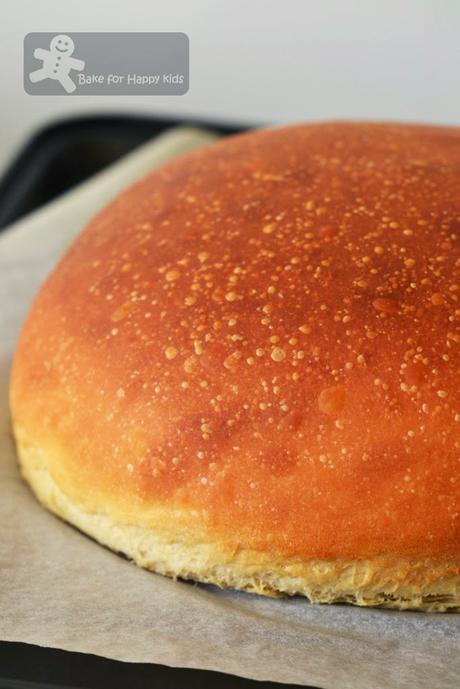
After baking - This sourdough bread is beautiful!!!
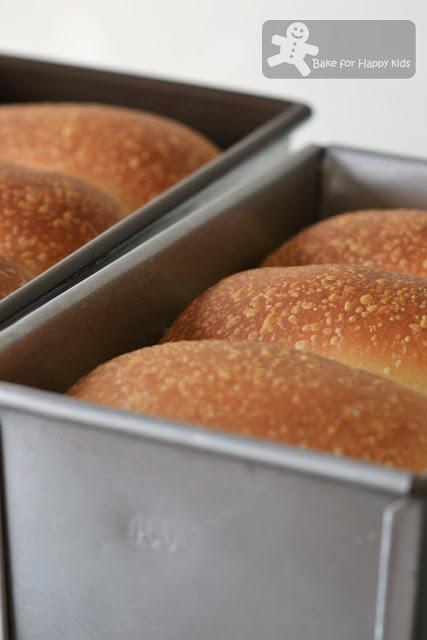
After baking - I saw the same beautiful crust on the overnight starter sandwich loaves too!
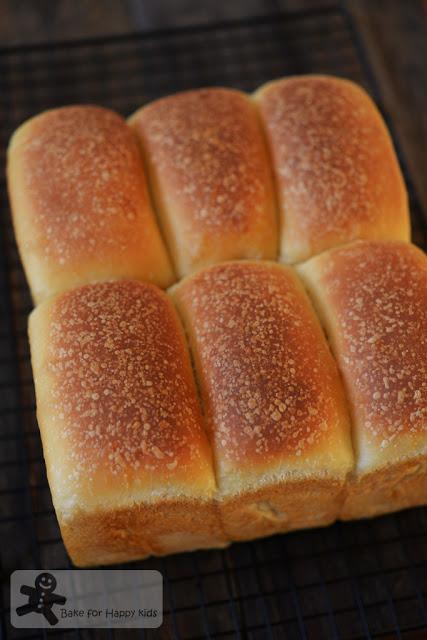
Wow!
I can't stop admiring these breads!!!
Two: The usual baking method
I have also tried this option to bake the sourdough loaf at 180°C with NO steam baking method and yielded this ordinary-looking super soft bread.
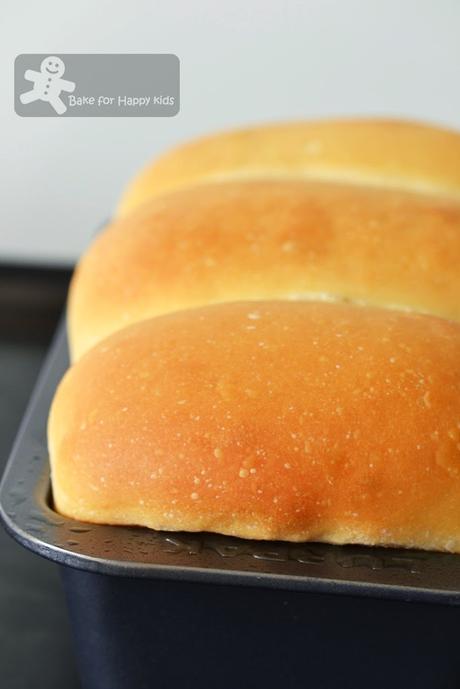
Another soft and beautiful sourdough loaf but the crust is not as dark as the steam baked ones.
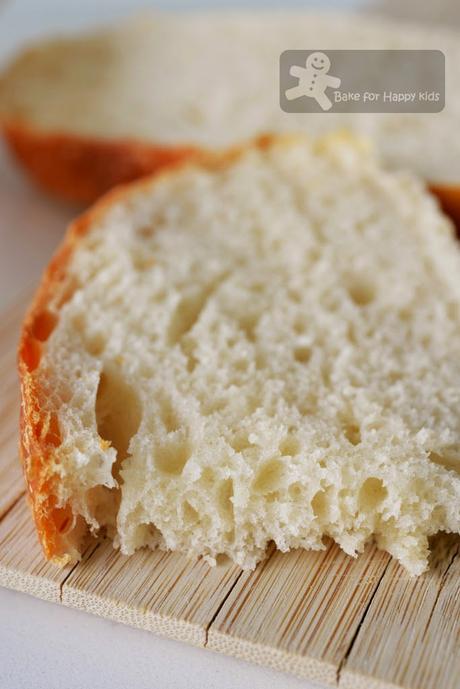
All breads that are made with the sourdough and overnight starter, with or without steam baking
... are soft, spongy and delicious!If I have to rate this recipe, I would say that it is 5 out of 5. If I can give it a rating of 6 out of 5, I would and would do it without any hesitation because this recipe has been constantly producing perfectly soft breads that are beyond my expectations.
Although I always like light-crusted breads, I would highly recommend baking this bread with the steam-baking method too because the breads with the deeper crust flavours are equally soft and delicious too!
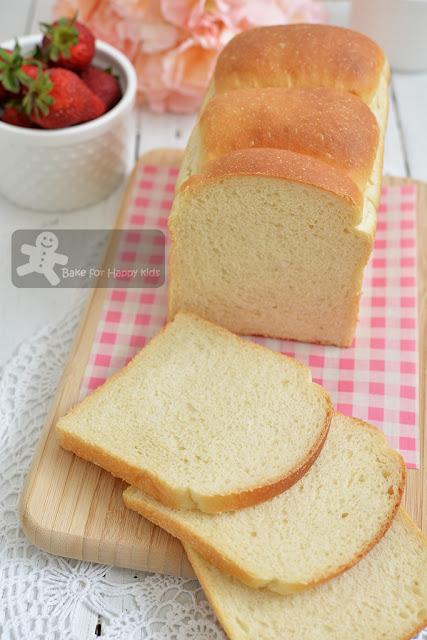
Once again...
I have used this recipe to bake another super soft bread...
... with an overnight yeast starter without using the steam baking option.
Here's my one-minute video showing how I baked these super soft breads.
And I promise that I won't squeeze or poke my breads in my video! LOL!
Why? I have learned from some Facebook posts (not mine! ops!) and several feedback that many readers are disgusted with bloggers that posted video of them squeezing their breads, cakes or any food. Hmmm... I see your point and I won't do that. LOL!
Well, I guess that you just have to believe me that these breads are super soft. And the only way to confirm is to bake them yourself!
Besides knowing that this recipe can bake super soft sourdough / sandwich breads using either sourdough or overnight starter, I have also know another super soft bread recipe that uses overnight starter recipe at here. Hence, I'm naming this recipe Super Soft Sandwich Bread with Sourdough or Overnight Starter Recipe TWO which is a sequel of the Recipe One at here
Which recipe is better? One or Two? I can't decide! Both are equally super soft and yet their composite are actually quite different. Why not try both and let me know if you like which one more?
Like I said earlier that this recipe is just a beginning and I will have more super soft bread recipes to share. So please stay tune if you are interested. To get the latest updates, you can follow me at either my Facebook at here or here or my Instagram @zoebakeforhappykids
Here's the recipe that is adapted from Wild Yeast Blog
Makes two 20 x 10 cm or 8 x 4 inches loaves or two large boules
For the sourdough starter:
150g 8-12 hr sourdough starter (please refer to here for details of making your own starter)150g water at room temperature
150g unbleached bread flour
If you don't have a sourdough starter, you use an instant yeast overnight starter. It can also make your bread that is equally soft but wouldn't give you the tangy and yogurt-like taste from the sourdough starter
For 350g instant yeast overnight starter:
175g water at room temperature175g unbleached bread flour
10g caster sugar
1/4 tsp instant dried yeast
To make either the sourdough starter or the instant yeast overnight starter:
On the day before the bake, mix all ingredients in a large mixing bowl or container until combined. Please do not use any bowl or container that is made of metal. The sponge will be the consistency of a thick batter.Cover the bowl and let the starter ferment until bubbly and active, 8 to 12 hrs, depending on the temperature of the room. For the instant yeast overnight starter, leave it to ferment for 1-2 hr in room temperature or until bubbly and then store it in the fridge overnight (16 to 24 hrs) until required. Bring overnight starter to room temperature at least for 1 hr before using it to make the bread dough.
350g sourdough or instant yeast overnight starter
275g water at room temperature
30g honey
530g unbleached bread flour
30g milk powder
14g salt
60g unsalted butter, soften at room temperature plus extra for greasing
1/2 tsp (for sourdough dough) or 1 tsp (for overnight starter dough) instant dried yeast, optional and omit if you don't mind waiting for extra 4-6 hrs
extra butter, softened at room temperature or vegetable oil spray, to grease the loaf pans
To make the bread dough:
Using an electric mixer or bread maker (with a dough setting), mix and knead all of the dough ingredients unit the dough is smooth and elastic.
If you are using an electric mixer to knead, transfer the dough into an oiled bowl. Cover with plastic wrap and allow the dough ferment for 2-3 hrs or until double the size. If you are using a bread maker, just leave the dough to prove in the breadmaker for 2-3 hrs after kneading. I have added instant dried yeast in my dough and so it requires only 1-2 hrs to prove.
Divide the dough into two.
To shape it into boule:
Place the dough on a lightly floured or non-stick surface. Fold the top, bottom, and sides of the dough toward the center. Turn the dough over, cover it with a towel or plastic wrap, and let it rest for 10 mins. While the dough is resting, line baking trays with baking papers.
Uncover the dough and round the loaf by pushing against the bottom of the dough all around with the sides of your hands held palms upward. The dough will quickly form an even sphere. Place the shaped dough with its smooth top facing upward onto one of the prepared baking tray. Repeat the shaping method with the other portion of the dough.To shape it into a loaf:
Grease loaf pan with butter or vegetable oil spray. Divide the dough further into 3 portions and shape each into balls. Allow them to rest at room temperature for about 10 mins. Using a rolling pin, roll one portion into long and flat oval shape (about 20 cm). Use your fingers to pick one shorter side of the dough, tuck and roll the dough like a Swiss roll. Use a rolling pin to flatten and roll the dough into a long rod shape again. Then, pick one shorter side of the dough and roll it like a Swiss roll again. Repeat this rolling step with the remaining portions of dough.Place three shaped dough with their seams side down into the prepared pan. Press the top of the dough lightly to form an even surface. Cover the dough with cling wrap loosely and allow the bread to prove for another 1.5-3 hrs or until doubled the size.There are two options to bake these breads.
One: Steam-baking method
This will yield bread with a deeper and flavoursome crust. Please note the crust will not be hard. It is slightly darker, more flavoursome with soft and chewy texture.Place rack in the middle of the oven and also a baking tray in the bottom of the oven. Then, get ready 1-2 glasses of iced water. Preheat the oven at 425°F or 220°C (with or without) fan forced.
Once the oven is ready, place the bread on the middle rack and pour the iced water onto the preheated tray at the bottom. Note: Most professional bakers transfer their bread dough onto a pre-heated baking stone or tray before baking it but I find that this step has been pretty daunting for me and so I just baked the bread that is placed on a non-heated tray.
Maintain the oven temperature at 425°F or 220°C or reduce to 200°C with fan forced and bake the bread for 10 mins. Then, decrease the oven temperature to 400°F or 200°C or 180°C with fan forced and continue to bake for 15 mins or until the crust is deep golden color. If the top of bread turns brown too quickly, cover the bread loosely with a foil and continue to bake it for at least 25 mins in total. Transfer bread immediately onto a wire rack and allow it to cool completely. Slice and serve.
Two: Ordinary non-steam baking method
This will yield very soft and oridinary-looking bread with no deep crusty flavours.Preheat the oven at 350°F or 180°C or 160°C with fan forced. Bake the bread in the middle rack for 25 mins. Allow it to cool completely on a wire rack. If the top of bread turns brown too quickly, cover the bread loosely with a foil and continue to bake it for at least 25 mins in total.
Transfer bread immediately onto a wire rack and allow it to cool completely. Slice and serve.
Happy BakingPlease support me and like me at Facebook...
